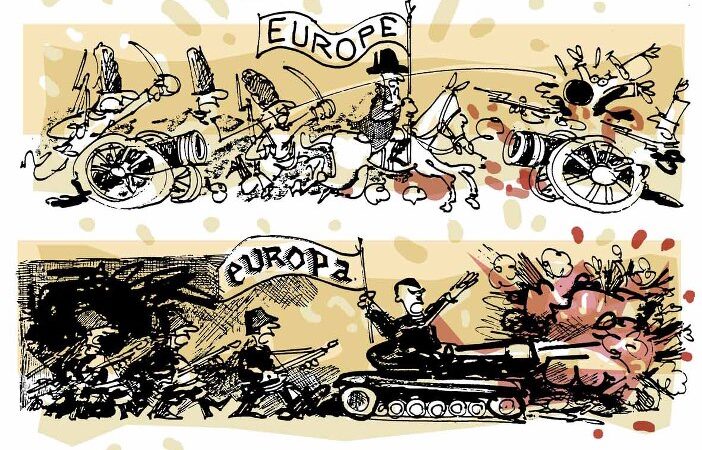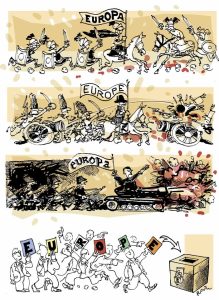The EU and peace

 There have been two lines of attack from UK EU-phobes to the news that the EU has been awarded the Nobel Peace Prize. One has been to point to the current economic travails of the EU, and the political strife that has caused, and to criticise the award as a result. For me the award looks slightly odd as a result of this poor timing (10 years ago would have been better), but it does not render the award wrong per se.
There have been two lines of attack from UK EU-phobes to the news that the EU has been awarded the Nobel Peace Prize. One has been to point to the current economic travails of the EU, and the political strife that has caused, and to criticise the award as a result. For me the award looks slightly odd as a result of this poor timing (10 years ago would have been better), but it does not render the award wrong per se.
Instead we must focus on the second critique: that the European Union has not delivered peace in Europe. There are a number of threads to this one – that it was NATO and the Americans that did it rather than the EU (Redwood – Telegraph), that Germany would not have gone to war again anyway (David Davis, on BBC radio I’m told), that economic interdependence would have meant war was unthinkable anyway, that wars in the Balkans in the EU were not prevented by the EU and hence render the peace argument invalid.
But look at this the other way: is, on balance, the role of the European Union positive or negative in ensuring peace in and among its 27 Member States? Can Redwood or Hannan or others seriously argue that the EU is a force AGAINST peace, and has been a force against it for the last 60 years?
Yes, NATO, economics etc. will also have had some sort of role to prevent further war, but the European Union helped this process too, and that is why the award is justified. 60 years without war in Western Europe is a tremendous achievement. I cannot prove either way whether Europe would have gone to war without the EU, but neither can Redwood or anyone else prove the opposite. We do not have a counterfactual, we do not know for sure. But on the balance of information we have available the EU has contributed to peace in Europe. What’s the problem with that?
(Cartoon: 1992 from Plantu – Source)
Ok, well my point WAS an etymological one …
I guess I’ll switch from calling people who seem to have an aversion to any traditional English constitutional arrangement Anglosceptics and start calling them Anglophobes.
No I am not stopping using the word EU-phobes. Because the entire pro-european / eurosceptic frame is not one that I am happy with either. What am I in that regard? OK, on balance, I think the existence of the EU is a good thing, but I dislike much of what the EU does – that makes me in some way a sceptic, but – according to the way the word is used – I am not a eurosceptic.
So EU-phobe might not be right, but eurosceptic is not right either.
Can you not say “Eurosceptics” instead of “EU-phobes”? We’re not afraid irrationally of the EU, and it demeans you to insinuate that we are.
Jon, I’m no Europhobe, but surely that’s a bad argument. Redwood can’t prove that the EU was a force against peace. True, and he’d be a fool to try. But by that standard of proof, you can’t prove that it was a force for peace either. On the balance of information we have available, the EU has contributed to peace? I disagree, the information we have available doesn’t distinguish two possible explanations: 1. The EU contributed to peace in Europe post-WWII and 2. Peace in Europe and the EU were both the result of the same things: post-WWII economics combined with a cold-war security logic. If we can’t distinguish between these two explanations, then what business do we have in positively asserting that the EU contributed to peace? I’d say the burden of proof is on those who assert a link, not those who question it. Besides, the Balkans did witness violence of such a horrific scale, whilst the EU sat still. Doesn’t it make your stomach turn to see this prize awarded to the EU in the face of such tragic, and definitely non-counterfactual, evidence?
It’s a real pity that for once we can’t just sit back and be proud to be Europeans. Instead we have to undertake soul searching about who did what when, whether the crisis makes this all irrelevant and well whether some of us want to be part of the thing in the first place. Anywhere else on the planet they’d just have a few beers, enjoy the moment and give thanks that we still are quite rich, quite healthy and quite peaceful compared with many other parts of the world.